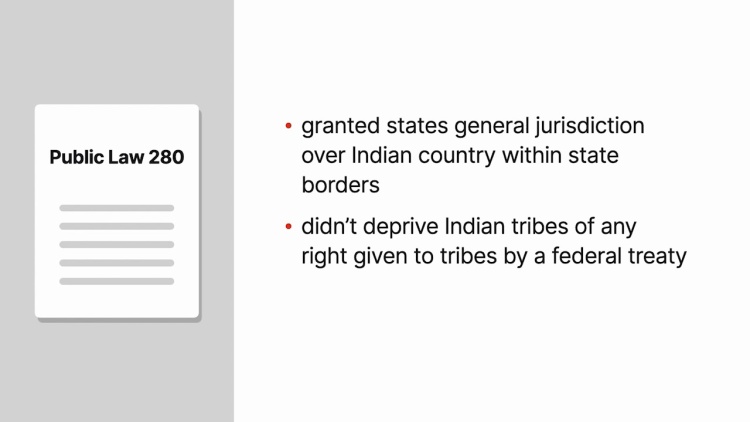Menominee Tribe of Indians v. United States
United States Supreme Court
391 U.S. 404, 88 S.Ct. 1705, 20 L.Ed.2d 697 (1968)
- Written by Lauren Groth, JD
Facts
In 1854, the Menominee Tribe (plaintiff) signed the Treaty of Wolf River (Treaty) with the United States (defendant). The Menominee Tribe lived in Wisconsin. Under the Treaty, the Menominee agreed to give up land that they had previously owned and to live only on the Wolf River reservation. Under the Treaty, the Menominee were granted the right to continue to live on this land as they always had, including the right to hunt and fish. In 1962, the State of Wisconsin began to subject the Menominee Tribe to the state’s hunting and fishing regulations, and punished tribe members who violated these regulations. The Wisconsin Supreme Court subsequently determined that the state was entitled to enforce its regulations against the Menominees because the Menominee Indian Termination Act of 1954 (Act), 25 U. S. C. §§ 891-902, had eliminated federal authority over the Menominees, including their hunting and fishing rights under federal treaties. Because they could not hunt and fish as they once had, the Menominees brought a claim in the United States Court of Claims to reimburse their tribe for the hunting and fishing rights that the tribe had lost. The Court of Claims held that the Act had not eliminated the Menominees’ hunting and fishing rights under the Treaty. The United States Supreme Court granted certiorari to determine whether the Court of Claims or the Wisconsin Supreme Court was correct.
Rule of Law
Issue
Holding and Reasoning (Douglas, J.)
Dissent (Stewart, J.)
What to do next…
Here's why 907,000 law students have relied on our case briefs:
- Written by law professors and practitioners, not other law students. 47,100 briefs, keyed to 996 casebooks. Top-notch customer support.
- The right amount of information, includes the facts, issues, rule of law, holding and reasoning, and any concurrences and dissents.
- Access in your classes, works on your mobile and tablet. Massive library of related video lessons and high quality multiple-choice questions.
- Easy to use, uniform format for every case brief. Written in plain English, not in legalese. Our briefs summarize and simplify; they don’t just repeat the court’s language.





